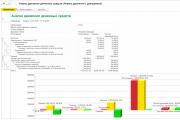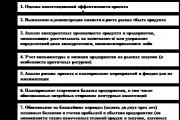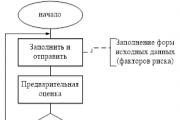08.05.2019
Birth control pills Novinet. Novinet: side effects and real prospects
Compound medicinal product Novinet
table p/captivity casing, No. 21 18.96 UAH. table p/captivity casing, No. 63 51.24 UAH.
Ethinyl estradiol 0.02 mg
Desogestrel 0.15 mg
Other ingredients: quinoline yellow dye, magnesium stearate, alpha-tocopherol, colloidal silicon anhydrous, povidone, potato starch, lactose monohydrate, propylene glycol, macrogol 6000, hypromellose, stearic acid.
Dosage form
pills Pharmacological properties
Novinet - combined hormonal contraceptive drug for systemic use, the effect of which is associated with inhibition of the effect of gonadotropins and inhibition of ovulation, as well as inhibition of sperm penetration through cervical mucus and implantation of a fertilized egg. The effect of the drug is due to the properties of its components: synthetic estrogen - ethinyl estradiol and synthetic progestogen - desogestrel, which, when administered orally, have a pronounced inhibitory effect on ovulation.
Desogestrel is rapidly absorbed and almost completely metabolized to 3-keto-desogestrel, which is a biologically active metabolite of desogestrel. The average maximum concentration of the drug in the blood serum (2 ng/ml) is achieved 1.5 hours after administration. Bioavailability - 62–81%. In the body, 3-keto-desogestrel binds to blood plasma proteins, mainly albumin and sex hormone binding globulin (SHBG). The volume of distribution is 1.5 l/kg.
In addition to 3-keto-desogestrel (which is formed in the liver and in the intestinal wall), there are other metabolites: 3α-OH-desogestrel, 3β-OH-desogestrel, 3α-OH-5α-H-desogestrel (first phase metabolites). These metabolites have no pharmacological activity; by conjugation they are partially converted (the second phase of metabolism) into polar metabolites, sulfates and glucuronates. Clearance from blood plasma is approximately 2 ml/min per 1 kg of body weight. The half-life of 3-keto-desogestrel is on average 30 hours. Metabolites are excreted in urine and feces in a ratio of 6:4. The equilibrium concentration is established in the second half of the cycle, at which time the level of keto-desogestrel increases 2-3 times.
Ethinyl estradiol is rapidly and completely absorbed. The average maximum serum concentration is 80 pg/ml and is achieved 1–2 hours after oral administration. Due to presystemic conjugation and the first-pass effect, bioavailability is approximately 60%. Ethinyl estradiol is completely bound to plasma proteins, mainly albumin. Causes an increase in sex hormone binding globulin (SHBG) levels. The volume of distribution is 5 l/kg. Presystemic conjugation of ethinyl estradiol is significant. Penetrating through the intestinal wall (first phase of metabolism), it undergoes conjugation in the liver (second phase of metabolism). Ethinyl estradiol and its conjugates (sulfates and glucuronides) are excreted in the bile and enter the enterohepatic circulation. Clearance from blood plasma is approximately 5 ml/min/kg body weight. The half-life of ethinyl estradiol is on average 24 hours. Approximately 40% is excreted in the urine and 60% in the feces. Steady-state concentrations are established on days 3–4, with serum ethinyl estradiol levels 30–40% higher than after a single dose.
Indications for use Novinet
contraception Contraindications
absolute contraindications: pregnancy or suspicion of it, moderate or severe hypertension, lipid metabolism disorders, the presence or history of arterial thromboembolic diseases (myocardial infarction, ischemic stroke), the risk of arterial or venous thromboembolism, the presence of venous thromboembolism in personal or family history, diabetic angiopathy, the presence or indication in the anamnesis of serious illnesses liver, cholestatic jaundice, hepatitis, jaundice during pregnancy, when used steroid drugs, with Dubin-Johnson syndrome or Rotor syndrome, with liver tumors, porphyria; hepatitis (within 3 months from the moment of normalization laboratory parameters), cholelithiasis, presence of estrogen-dependent tumors or suspicion of them, endometrial hyperplasia, genital bleeding unknown etiology; presence or history of systemic lupus erythematosus, previously noted skin itching, genital herpes, otosclerosis or progression of otosclerosis during a previous pregnancy or steroid use; increased sensitivity to the components of the drug. Relative contraindications(if any of the following conditions are present, the benefits or possible negative effects of taking oral contraceptives are assessed individually): disorders of the blood coagulation system, all diseases in which there is a possibility of circulatory disorders: heart failure, renal failure, as well as a history of these diseases; epilepsy or a history of it; migraine or a history of it; history of cholelithiasis; risk of developing an estrogen-dependent tumor or estrogen-dependent gynecological diseases; diabetes; presence of severe depression, including a history of depression; sickle cell anemia. Cautions for use
Before prescribing the drug, a detailed family and personal history should be collected, a general and gynecological examination(blood pressure measurement, laboratory tests, examination of the mammary glands and pelvic organs, cytological examination smears) to exclude diseases the risk of which increases with the use of oral contraceptives. Examinations must be repeated periodically. When deciding whether to prescribe oral contraceptives, one should evaluate the ratio of potential risks and benefits of their use, in particular, oncoprotective properties against ovarian and endometrial cancer. If there are changes in liver function tests, the drug should be discontinued.
If any of the above conditions occur or worsen while using the drug, you should stop taking it and switch to using a non-hormonal method of contraception.
Taking oral contraceptives may be accompanied by changes in certain indicators laboratory research(functional tests of the liver, kidneys, adrenal glands, thyroid gland, indicators of blood coagulation and fibrinolytic activity, levels of lipoproteins and transport proteins).
The risk of developing arterial or venous thromboembolic complications increases with age, smoking (a factor increased risk considered heavy smoking in women over 35 years of age), the presence of thromboembolic diseases in personal and family history (parents, brother or sister), obesity (body mass index above 30 kg/m2), dyslipoproteinemia, hypertension, heart valve diseases, atrial fibrillation, diabetes mellitus, prolonged immobilization, after extensive surgery, interventions on lower limbs, severe injuries. It is recommended to stop taking the drug 4 weeks before surgical intervention and resume 2 weeks after remobilization.
The risk of developing thromboembolic complications is increased in diabetes mellitus, systemic lupus erythematosus, hemolytic-uremic syndrome, Crohn's disease, ulcerative colitis, and sickle cell anemia.
If a dose is missed, but no more than 12 hours have passed since the missed dose, you should take the missed tablet and then continue taking the drug at the usual time. If more than 12 hours have passed since the missed period, the reliability of contraception in this cycle is not guaranteed, the use of additional methods of contraception is recommended. If a dose is missed in the 1st or 2nd week of the cycle, you must take 2 tablets the next day, and then continue taking the drug regularly, using additional methods of contraception until the end of the cycle. If a dose is missed in the 3rd week of the cycle, you should take the missed tablet and continue taking the drug regularly without a 7-day break. Due to the minimal dose of estrogen, the risk of ovulation and/or spotting if a dose is missed is increased, so the use of additional methods of contraception is recommended.
If vomiting or diarrhea was observed after taking the drug, absorption of its components may be incomplete. If these symptoms disappear within 12 hours, you must take one additional tablet. After this, taking the drug should continue as usual. If vomiting and diarrhea continue for more than 12 hours, additional methods of contraception must be used that day and for the next 7 days.
The appearance of irregular, spotting or breakthrough bleeding after several months of using the drug may indicate a decrease in its effectiveness. If menstrual-like bleeding does not begin at the end of the second cycle, taking the pills should be stopped and resumed only after eliminating possible pregnancy.
The drug did not have a teratogenic effect when taken accidentally at the beginning of pregnancy. The use of combined oral contraceptives during breastfeeding is not recommended as they can reduce the secretion of breast milk.
Interactions with drugs
cycle disruptions or decreased effectiveness are possible when combined with Novinet antispasmodics, barbiturates, antibiotics (tetracycline, ampicillin, rifampicin, griseofulvin), laxatives and some medicinal plants(for example St. John's wort). Oral contraceptives may reduce carbohydrate tolerance, which may require dose adjustments of insulin or oral antidiabetic agents. Directions for use and dosage Novinet
taking the drug starts on day 1 menstrual cycle and take 1 tablet per day for 21 days, if possible at the same time of day. After taking the last tablet, take a 7-day break, during which menstrual-like bleeding occurs as a result of drug withdrawal. The next day after a 7-day break (4 weeks after taking the first tablet, on the same day of the week) resume taking from the next package, which contains 21 tablets, even if the bleeding has not stopped. Thus, the pills continue to be taken as long as there is a need for contraception. If you follow the rules of administration, the contraceptive effect of the drug remains during the 7-day break. First dose of the drug
The first tablet should be taken on the 1st day of the menstrual cycle. In this case, additional methods of contraception are not needed.
You can start taking pills from the 2nd–5th day of menstruation, but in this case, in the first cycle, additional methods of contraception should be used in the first 7 days of taking the pills. If more than 5 days have passed since the start of menstruation, you should postpone the start of use until the next menstruation.
Taking the drug after childbirth
Women who are not breastfeeding should start taking the pill 21 days after giving birth. In this case, there is no need to use other methods of contraception.
If after childbirth there was already sexual contact, taking the drug should be postponed until the next menstruation.
If a woman decides to take the drug later than 21 days after birth, then additional methods of contraception must be used in the first 7 days.
Taking the drug after an abortion
Taking the drug should begin on the 1st day after the abortion; in this case, there is no need to use additional methods of contraception.
Switching from taking another oral contraceptive
When transferring a woman to Novinet from another oral contraceptive (21, 22 or 28-day drug), it is recommended to take the first Novinet tablet the day after the end of the course of the previous drug. There is no need to take a break or wait for your period to start. There is no need to use additional methods of contraception.
When switching to Novinet from the so-called oral drug“mini-pill” containing only progestogen, the first Novinet tablet should be taken on the 1st day of the cycle. There is no need to use additional methods of contraception. If menstruation does not occur while taking the mini-pill, you can start taking Novinet on any day of the cycle, but be sure to use additional methods of contraception in the first 7 days.
As additional methods of contraception in these cases, it is recommended to use non-hormonal methods (cervical cap with spermicidal gel, condom). The calendar method is not recommended in this case.
Delayed menstrual cycle
If there is a need to delay menstruation, you need to continue taking tablets from new packaging without a 7-day break according to the usual scheme. If menstruation is delayed, breakthrough and spotting bleeding may occur, which is not evidence of a decrease in the contraceptive effect of the drug. Regular use of Novinet can be resumed after the usual 7-day break.
Side effects
intermenstrual bleeding, amenorrhea after drug withdrawal, changes in vaginal mucus, growth of uterine fibroids, the occurrence vaginal infections; feeling of tension, soreness and enlargement of the mammary glands, galactorrhea; nausea, vomiting, cholelithiasis, cholestatic jaundice; erythema nodosum, rash, chloasma; increased sensitivity of the cornea when using contact lenses; headache, migraine, mood changes, depression; fluid retention in the body, changes in body weight, decreased tolerance to carbohydrates. The drug should be stopped immediately if severe side effects such as thrombosis and thromboembolism occur (myocardial infarction, stroke, deep vein thrombosis of the lower extremities, pulmonary embolism, hepatic, mesenteric, renal arteries or retinal vessels), severe hypertension or medium degree severity, the occurrence of hormone-dependent tumors, breast cancer, reactive systemic lupus erythematosus, Sydenham chorea. Possible development of benign or malignant tumor liver in women who have been taking hormonal contraceptives for a long time. Overdose
Possible severe headache dyspeptic symptoms, convulsions calf muscles. There is no specific antidote, treatment is symptomatic. Novinet is a combined hormonal contraceptive drug for systemic use, the action of which is associated with inhibition of the effect of gonadotropins and suppression of ovulation, as well as a decrease in the penetration of sperm through the cervical mucus and implantation of a fertilized egg.
The effect of the drug is due to the properties of its components: synthetic estrogen - ethinyl estradiol and synthetic progestogen - desogestrel, which, when administered orally, have a pronounced inhibitory effect on ovulation.
Desogestrel is rapidly absorbed and almost completely metabolized to 3-keto-desogestrel, which is a biologically active metabolite of desogestrel. The average maximum concentration of the drug in the blood serum (2 ng/ml) is achieved 1.5 hours after administration. Bioavailability - 62-81%. In the body, 3-keto-desogestrel binds to blood plasma proteins, mainly albumin and sex hormone binding globulin (SHBG). The volume of distribution is 1.5 l/kg.
In addition to 3-keto-desogestrel (which is formed in the liver and in the intestinal wall), there are other metabolites: 3α-OH-desogestrel, 3β-OH-desogestrel, 3α-OH-5α-H-desogestrel (first phase metabolites). These metabolites have no pharmacological activity; by conjugation they are partially converted (the second phase of metabolism) into polar metabolites, sulfates and glucuronates. Blood plasma clearance is about 2 ml/min per 1 kg of body weight. The half-life of 3-keto-desogestrel is on average 30 hours. Metabolites are excreted in urine and feces in a ratio of 6:4. The equilibrium concentration is established in the second half of the cycle, at which time the level of keto-desogestrel increases 2-3 times.
Ethinyl estradiol is rapidly and completely absorbed. The average maximum concentration in the blood serum is 80 pg/ml and is achieved 1-2 hours after oral administration. Due to presystemic conjugation and the first-pass effect, bioavailability is approximately 60%. Ethinyl estradiol is completely bound to plasma proteins, mainly albumin. Causes an increase in sex hormone binding globulin (SHBG) levels. The volume of distribution is 5 l/kg. Presystemic conjugation of ethinyl estradiol is significant. Penetrating through the intestinal wall (first phase of metabolism), it undergoes conjugation in the liver (second phase of metabolism). Ethinyl estradiol and its conjugates (sulfates and glucuronides) are excreted in the bile and enter the enterohepatic circulation. Blood plasma clearance is about 5 ml/min/kg body weight. The half-life of ethinyl estradiol is on average 24 hours. Approximately 40% is excreted in the urine and 60% in the feces. The equilibrium concentration is established on the 3-4th day, while the level of ethinyl estradiol in the blood serum is 30-40% higher than after a single dose.
Indications for use of the drug Novinet
Contraception.
Use of the drug Novinet
Taking the drug begins on the 1st day of the menstrual cycle and takes 1 tablet per day for 21 days, if possible at the same time of day. After taking the last tablet, take a 7-day break, during which menstrual-like bleeding occurs as a result of drug withdrawal. The next day after a 7-day break (4 weeks after taking the first tablet, on the same day of the week) resume taking from the next package, which contains 21 tablets, even if the bleeding has not stopped. Thus, the pills continue to be taken as long as there is a need for contraception. If you follow the rules of administration, the contraceptive effect of the drug remains during the 7-day break.
First dose of the drug
The first tablet should be taken on the 1st day of the menstrual cycle. In this case, additional methods of contraception are not required.
You can start taking pills from the 2-5th day of menstruation, but in this case, in the first cycle, additional methods of contraception should be used in the first 7 days of taking the pills. If more than 5 days have passed since the start of menstruation, it is necessary to postpone the start of use until the next menstruation.
Taking the drug after childbirth
Women who are not breastfeeding should start taking the pill 21 days after giving birth. In this case, there is no need to use other methods of contraception.
If there has already been sexual intercourse after childbirth, taking the drug should be postponed until the next menstruation.
If a woman decides to take the drug later than 21 days after birth, then additional methods of contraception must be used in the first 7 days.
Taking the drug after an abortion
Taking the drug should begin on the 1st day after the abortion; in this case, there is no need to use additional methods of contraception.
Switching from taking another oral contraceptive
When transferring a woman to Novinet from another oral contraceptive (21-, 22- or 28-day drug), it is recommended to take the first Novinet tablet the day after the end of the course of the previous drug. There is no need to take a break or wait for your period to start. There is no need to use additional methods of contraception.
When switching to Novinet from a so-called oral mini-pill containing only progestogen, the first Novinet tablet should be taken on the 1st day of the cycle. There is no need to use additional methods of contraception. If menstruation does not occur while taking the mini-pill, you can start taking Novinet on any day of the cycle, but be sure to use additional methods of contraception in the first 7 days.
As additional methods of contraception in these cases, it is recommended to use non-hormonal methods (cervical cap with spermicidal gel, condom). The calendar method is not recommended in this case.
Delayed menstrual cycle
If there is a need to delay menstruation, you must continue taking the tablets from the new package without a 7-day break according to the usual regimen. If menstruation is delayed, breakthrough and spotting bleeding may occur, which is not evidence of a decrease in the contraceptive effect of the drug. Regular use of Novinet can be resumed after the usual 7-day break.
Contraindications to the use of the drug Novinet
Absolute contraindications: pregnancy or suspicion of it, hypertension ( arterial hypertension) moderate or severe, lipid metabolism disorders, the presence or a history of arterial thromboembolic diseases (myocardial infarction, ischemic stroke), the risk of arterial or venous thromboembolism, the presence of venous thromboembolism in a personal or family history, diabetic angiopathy, the presence or indication of history of severe liver disease, cholestatic jaundice, hepatitis, jaundice during pregnancy, when using steroid drugs, with Dubin-Johnson syndrome or Rotor syndrome, with liver tumors, porphyria; hepatitis (within 3 months from the moment of normalization of laboratory parameters), cholelithiasis, the presence of estrogen-dependent tumors or suspicion of them, endometrial hyperplasia, genital bleeding of unknown etiology; presence or history of systemic lupus erythematosus, previously noted pruritus, genital herpes, otosclerosis, or progression of otosclerosis during a previous pregnancy or while taking steroids; hypersensitivity to the components of the drug. Relative contraindications (in the presence of any of the following conditions, the benefits or possible negative effects of taking oral contraceptives are assessed individually): disorders of the blood coagulation system, all diseases in which there is a possibility of circulatory disorders: heart failure, renal failure, as well as a history of these diseases ; epilepsy or a history of it; migraine or a history of it; history of cholelithiasis; the risk of developing an estrogen-dependent tumor or estrogen-dependent gynecological diseases; diabetes; presence of severe depression, including a history of depression; sickle cell anemia.
Side effects of the drug Novinet
Intermenstrual bleeding, amenorrhea after discontinuation of the drug, changes in vaginal mucus, growth of uterine fibroids, the occurrence of vaginal infections; feeling of tension, soreness and enlargement of the mammary glands, galactorrhea; nausea, vomiting, cholelithiasis, cholestatic jaundice; erythema nodosum, rash, chloasma; increased sensitivity of the cornea when using contact lenses; headache, migraine, mood changes, depression; fluid retention in the body, changes in body weight, decreased tolerance to carbohydrates. The drug should be stopped immediately if such severe side effects occur as thrombosis and thromboembolism (myocardial infarction, stroke, deep vein thrombosis of the lower extremities, thromboembolism of the pulmonary, hepatic, mesenteric, renal arteries or retinal vessels), hypertension (arterial hypertension) severe or moderate severity, the occurrence of hormone-dependent tumors, breast cancer, reactive systemic lupus erythematosus, Sydenham's chorea. It is possible to develop a benign or malignant liver tumor in women who have been taking hormonal contraceptives for a long time.
Special instructions for the use of the drug Novinet
Before prescribing the drug, you should collect a detailed family and personal history, conduct a general and gynecological examination (measurement of blood pressure, laboratory tests, examination of the mammary glands and pelvic organs, cytological examination of smears) to exclude diseases, the risk of which increases with the use of oral contraceptives. Examinations must be repeated periodically. When deciding whether to prescribe oral contraceptives, one should evaluate the ratio of potential risks and benefits of their use, in particular, oncoprotective properties against ovarian and endometrial cancer.
If liver function test results change, the drug should be discontinued.
If any of the above conditions occur or progress while using the drug, it must be stopped and switched to using a non-hormonal method of contraception.
Taking oral contraceptives may be accompanied by changes in some laboratory test parameters (functional tests of the liver, kidneys, adrenal glands, thyroid gland, blood coagulation and fibrinolytic activity, levels of lipoproteins and transport proteins).
The risk of developing arterial or venous thromboembolic complications increases with age, smoking (heavy smoking is considered an increased risk factor in women over 35 years of age), the presence of thromboembolic diseases in personal and family history (parents, brother or sister), and obesity (index body weight 30 kg/m2), dyslipoproteinemia, hypertension (arterial hypertension), heart valve diseases, atrial fibrillation, diabetes mellitus, prolonged immobilization, after extensive surgical interventions, interventions on the lower extremities, severe injuries. It is recommended to stop taking the drug 4 weeks before surgery and resume 2 weeks after remobilization.
The risk of developing thromboembolic complications is increased in diabetes mellitus, systemic lupus erythematosus, hemolytic-uremic syndrome, Crohn's disease, ulcerative colitis, and sickle cell anemia.
If a dose is missed, but no more than 12 hours have passed since the missed dose, you should take the missed tablet and then continue taking the drug at the usual time. If more than 12 hours have passed since the missed period, the reliability of contraception in this cycle is not guaranteed, the use of additional methods of contraception is recommended. If a dose is missed in the 1st or 2nd week of the cycle, you must take 2 tablets the next day, and then continue taking the drug regularly, using additional methods of contraception until the end of the cycle. If a dose is missed in the 3rd week of the cycle, you should take the missed tablet and continue taking the drug regularly without a 7-day break. Due to the minimal dose of estrogen, the risk of ovulation and/or spotting if a dose is missed is increased, so the use of additional methods of contraception is recommended.
If vomiting or diarrhea was noted after taking the drug, absorption of its components may be incomplete. If these symptoms disappear within 12 hours, you must take 1 additional tablet. After this, taking the drug should continue as usual. If vomiting and diarrhea continue for more than 12 hours, additional methods of contraception must be used that day and for the next 7 days.
The appearance of irregular, spotting or breakthrough bleeding after several months of using the drug may indicate a decrease in its effectiveness. If menstrual-like bleeding does not begin at the end of the second cycle, taking the pills should be stopped and resumed only after possible pregnancy has been ruled out.
The drug did not have a teratogenic effect when taken accidentally at the beginning of pregnancy. The use of combined oral contraceptives during breastfeeding is not recommended as they can reduce the secretion of breast milk.
Interactions of the drug Novinet
Cycle disturbances or decreased effectiveness are possible when combined with Novinet antispasmodics, barbiturates, antibiotics (tetracycline, ampicillin, rifampicin, griseofulvin), laxatives and some medicinal plants (for example, St. John's wort). Oral contraceptives may reduce carbohydrate tolerance, which may require dose adjustments of insulin or oral antidiabetic agents.
Overdose of the drug Novinet, symptoms and treatment
Severe headache, dyspeptic symptoms, and calf muscle cramps are possible. There is no specific antidote, treatment is symptomatic.
Storage conditions for the drug Novinet
At a temperature of 15-30 °C.
List of pharmacies where you can buy Novinet:
Last update of the description by the manufacturer 07/15/2014
Filterable list
Active substance:
ATX
Pharmacological group
Nosological classification (ICD-10)
3D images
Compound
pharmachologic effect
pharmachologic effect- estrogen-progestogenic, contraceptive.
Directions for use and doses
Inside. Taking pills starts on the 1st day of the menstrual cycle and takes 1 tablet. per day for 21 days, if possible at the same time of day. After taking the last tablet from the package, take a 7-day break, during which menstrual-like bleeding occurs due to drug withdrawal. The next day after a 7-day break (4 weeks after taking the 1st tablet, on the same day of the week), resume taking the drug from the next package, also containing 21 tablets, even if the bleeding has not stopped. This pill regimen is followed as long as there is a need for contraception. If the rules of administration are followed, the contraceptive effect is maintained during the 7-day break.
1st dose of the drug
Reception of the 1st table. should start on the 1st day of the menstrual cycle. In this case, it is not necessary to use additional methods of contraception. You can start taking pills from the 2-5th day of menstruation, but in this case, in the 1st cycle of using the drug, you must use additional methods of contraception in the first 7 days of taking the pills. If more than 5 days have passed since the start of menstruation, you should delay starting the drug until your next menstruation.
Taking the drug after childbirth
Women who are not breastfeeding can start taking the pills no earlier than the 21st day after giving birth, after consulting with their doctor. In this case, there is no need to use other methods of contraception. If you have already had sexual contact after giving birth, then you should wait until your first menstruation to take the pills. If a decision is made to take the drug later than 21 days after birth, then additional methods of contraception must be used in the first 7 days.
Taking the drug after an abortion
After an abortion, in the absence of contraindications, you should start taking pills from the 1st day, and in this case there is no need to use additional methods of contraception.
Switching from another oral contraceptive
Taking Novinet ® after a contraceptive (with 30 mcg ethinyl estradiol) containing 21 tablets. 1st table Novinet ® is recommended to be taken the next day after completing the course of the previous drug. There is no need to take a 7-day break or wait for the start of menstruation. There is no need to use additional methods of contraception.
Taking Novinet ® after a contraceptive containing 28 tablets. The next day after the tablets in the package run out, you should start a new package of Novinet ® .
Taking Novinet ® after using a contraceptive containing only progestogen (mini-pill). 1st table Novinet ® should be taken on the 1st day of the cycle. There is no need to use additional methods of contraception.
If menstruation does not occur while taking the mini-pill, then after excluding pregnancy, you can start taking Novinet ® on any day of the cycle, but in this case, additional methods of contraception must be used in the first 7 days.
In the above cases, the following non-hormonal methods are recommended as additional methods of contraception: the use of a cervical cap with spermicidal gel, a condom, or abstinence from sexual intercourse. The use of the calendar method in these cases is not recommended.
Delay of the menstrual cycle
If there is a need to delay menstruation, you must continue taking the tablets from the new package without a 7-day break, according to the usual regimen. When menstruation is delayed, breakthrough or spotting bleeding may appear, but this does not reduce contraceptive effect drug. Regular use of Novinet ® can be resumed after the usual 7-day break.
Missed pills
If a woman forgot to take the pill on time, and no more than 12 hours have passed since the omission, she just needs to take forgotten pill, and then continue taking it at the usual time. If more than 12 hours have passed between taking pills, this is considered a missed pill, the reliability of contraception in this cycle is not guaranteed and the use of additional methods of contraception is recommended.
If you miss one tablet on the 1st or 2nd week of the cycle, you must take 2 tablets. the next day and then continue regular use using additional methods of contraception until the end of the cycle. If you miss a pill in the 3rd week of the cycle, you must take the forgotten pill, continue taking it regularly and do not take a 7-day break. It is important to remember that due to the minimum dose of estrogen, the risk of ovulation and/or spotting increases if a pill is missed, and therefore the use of additional methods of contraception is recommended.
Directions for vomiting or diarrhea
If vomiting or diarrhea occurs after taking the drug, then absorption of the drug may be inadequate. If the symptoms stop within 12 hours, then you need to take 1 more tablet. additionally. After this, you should continue taking the tablets as usual. If symptoms continue for more than 12 hours, then it is necessary to use additional methods of contraception during vomiting or diarrhea and for the next 7 days.
Release form
Tablets, coated film-coated, 0.02 mg+0.15 mg. In a blister of aluminum/PVC/PVDC, 21 pcs. 1 or 3 blisters in a cardboard box.
The medication is a hormonal contraceptive, belonging to the category of monophasic oral contraceptives. It contains a daily dose of the estrogen component, so the medicine is microdosed. Women reproductive age use it to prevent unwanted pregnancy. General principle The action of the drug is to suppress ovulation and prevent sperm from penetrating through cervical canal.
Instructions for use of Novinet
The effectiveness of the drug is due to the content of synthetic estrogenic and progestin components, which are more effective compared to natural sex hormones. The advantage of the drug is the absence of beneficial metabolic effects on lipid and carbohydrate metabolism, increasing the concentration of lipoproteins. In addition, judging by the reviews, the drug is well tolerated and has minimal side effects, but this requires the use of the medication strictly according to the instructions.
Composition and release form
The drug is available in only one form - film-coated tablets. They are light yellow in color and have biconvex shape and markings on both sides: on one - P9, on the other - RG. The composition of Novinet is reflected in more detail in the table:
Pharmacodynamics and pharmacokinetics
The active components in the drug prevent ovulation. This property is due to the prevention of the release of hormones: follitropin and luteotropin. The effect is enhanced by increasing the viscosity of cervical mucus. This makes it more difficult for sperm to penetrate the uterine cavity. The risk of estrogen-dependent side effects is minimized, since the concentration of the estrogen component in the drug is very low.
The second active component, called desogestrel, is a second generation gestagen. It normalizes lipid profiles, ensures cholesterol balance, and has a positive effect on metabolism. As a result of the combined action of desogestrel and ethinyl estradiol:
- skin condition improves;
- blood loss is reduced;
- the probability decreases gynecological pathologies, including tumor ones;
- the menstrual cycle is normalized.
Suction active substances occurs in the proximal region small intestine. Their advantage is that they are absorbed quickly and almost completely. Desogestrel has 3-keto-desogestrel as its main metabolic product. The activity of its other metabolites is practically zero. The bioavailability of desogestrel is 62-81%, and ethinyl estradiol - 60%. The degree of protein binding is high for both substances. Their maximum concentration is reached 1-1.5 hours after administration. Other characteristics of the pharmacokinetics of the contraceptive:
- The half-life of desogestrel is 30 hours, and that of ethinyl estradiol is 24 hours;
- a tenth of the dose taken is found in the breast milk of a nursing woman;
- ethinyl estradiol is able to accumulate in adipose tissue, and its metabolic products are eliminated in bile (60%) and urine (40%);
- Metabolic products of desogestrel are excreted by the kidneys.
Indications for use
The main indication for the use of Novinet is protection against unwanted pregnancy. This drug is considered the first-line contraceptive of choice. Additionally, the medicine can be used for:
- premenstrual syndrome;
- dysmenorrhea;
- fibroids;
- functional disorders of the menstrual cycle.
How to take Novinet
Birth control pills Novinet are indicated for oral administration. They are taken orally with plenty of liquid. The course must be started no later than the 5th day of the menstrual cycle. When the tablet is taken on days 2-5, then in the first week you need to use additional ways contraception. No absences or breaks are allowed for three weeks. You must take the tablet at the same time every day. Conditions for taking the contraceptive:
- a week break is taken from 22 to 28 days of the menstrual cycle;
- on the 29th day the course is resumed, even if the bleeding has not stopped (a new pack will be required, the start of the new course falls on the same day of the week);
- if more than 5 days have passed since the start of menstrual bleeding, then the start of the course should be postponed until next cycle;
- with strict adherence to the dosage regimen, the contraceptive effect is observed in the period from 22 to 29 days of the cycle.
If you miss a pill, you may experience spotting or ovulation. This is explained minimum concentration estrogen in Novinet. In this case, it is necessary to take additional contraceptive measures before starting a new cycle. With vomiting and diarrhea, the effectiveness of the contraceptive is reduced. If they go away within 12 hours, then you need to take another tablet. Then continue the standard scheme. If vomiting or diarrhea lasts longer, then you should use additional methods contraception.
Novinet after childbirth or abortion
If a woman is not breastfeeding, she can take a contraceptive from the first day of her first spontaneous menstruation. Before starting the course, you must consult a doctor. In most cases, additional contraceptive measures are not required. Use of contraception in different conditions:
- if there was sexual intercourse after childbirth, then you need to start taking the pills during the next menstruation;
- when the use of a contraceptive occurred later than 3 weeks after birth, additional protective measures must be used in the first week;
- after spontaneous abortion or induced abortion The contraceptive should be taken immediately, without using other means of contraception.
Switching from other contraceptives
When using other combined oral contraceptives, it is important to make the switch correctly. The next drug is started after completing the course of previous drugs. You cannot take a break; you do not need to wait for the next menstruation. If you have previously used contraceptives containing only progestin, then the pills should be taken on the first day of the menstrual cycle. Additional protection using barrier contraceptives, avoiding intimacy for a while dangerous period not required. Doctors do not recommend calendar method.

special instructions
The drug does not have a protective effect against AIDS and sexually transmitted diseases. After the postponed viral hepatitis you need to wait until the indicators functional state the liver will return to normal. Only after this can you take a contraceptive. It is impossible to start the course earlier than six months after illness. When providing contraception, it is necessary to take into account that the contraceptive effect of pills is reduced if:
- diarrhea or vomiting;
- skipping a pill;
- simultaneous use of drugs that reduce the effect of combined oral contraceptives.
The effectiveness becomes lower when a woman develops spotting, irregular and breakthrough discharge after several cycles of taking the medicine. Contraception in this case is ensured by using one course of not one, but two packs of medication at once until the last one runs out. If after the second cycle acyclic discharge persists or withdrawal bleeding has not begun, then resumption of use is possible only after excluding possible pregnancy.
During pregnancy
The gestation period is absolute contraindication to the use of this medication. Combined oral contraceptives capable of suppressing lactation. In addition, some of the active components penetrate into breast milk. For this reason, during lactation such a drug is not the drug of choice. Taking a contraceptive is possible starting from the sixth month of breastfeeding.
Due to the use of Novinet before pregnancy, the risk of developing various fetal defects does not increase. If you unintentionally take a contraceptive early stages teratogenic or mutagenic effects are not observed. Taking Novinet also does not affect the sex of the fetus. It is worth noting that the potential risks associated with taking hormonal drugs significantly outweigh their benefits. If pregnancy has been established or is suspected, the hormonal drug should be discontinued.
Drug interactions
If you combine a contraceptive with drugs that induce liver enzymes, the effectiveness of pregnancy protection is reduced. These medications include:
- Griseofulvin;
- barbiturates;
- Hydantoin;
- Carbamazepine;
- Rifampicin;
- Primidone;
- Oxcarbazepine;
- Felbamate;
- Topiramate.
These drugs increase the likelihood of bleeding. The maximum level of induction of the contraceptive is observed for 14-20 days, but can persist for a month after discontinuation of the drug. If there is a need to take Ampicillin or Tetracycline, then the use of additional contraceptive measures is required throughout the entire course and for another week after completion. In the case of Rifampicin, Novinet must be taken within 4 weeks after completion of treatment.
Because COCs reduce carbohydrate tolerance, the need for insulin or oral antidiabetic agents increases. The contraceptive should be used with caution by the following means:
- bromocriptine;
- beta-adrenergic receptor blockers;
- tricyclic antidepressants;
- hepatotoxic agents, including Dantrolene;
- coumarin and indanedione anticoagulants.

Side effects of Novinet
When negative reactions After taking a contraceptive, the question of its further use is decided individually for each patient. Potential side effects include:
- amenorrhea;
- candidiasis;
- nausea;
- jaundice or itching associated with cholestasis;
- soreness and enlargement of the mammary glands;
- acyclic vaginal discharge;
- chloasma;
- ulcerative colitis;
- skin rashes;
- vomit;
- changes in the state of mucus in the vagina;
- depression;
- migraine;
- decreased libido;
- hypersensitivity reactions;
- headache;
- nodular or exudative erythema;
- inflammatory processes in the vagina;
- fluid retention in the body;
- weight gain;
- eye sensitivity to contact lenses.
There are a number of particularly severe side effects in which taking the contraceptive requires immediate withdrawal. The list of such negative reactions includes:
- hypertension;
- porphyria;
- acute blockage of veins or arteries blood clots;
- otosclerosis, hearing loss;
- myocardial infarction, stroke (extremely rare);
- Sydenham's chorea;
- exacerbation of Libman-Sachs disease.
Overdose
Nausea and vomiting indicate a contraceptive overdose. It is possible that other side effects of the medication may increase. In girls, exceeding the dose is manifested by bloody discharge. If an overdose is detected in a timely manner, gastric lavage is necessary in the first hours of administration. There is no antidote, and treatment is symptomatic.
Contraindications
Before you start using this contraceptive, you must study the list of contraindications. It includes many diseases and special conditions of the body. Their list is as follows:
- otosclerosis;
- initial signs thromboembolism;
- smoking;
- pregnancy, lactation;
- migraine with neurological signs;
- thrombosis;
- increased sensitivity to the composition;
- vaginal bleeding;
- pancreatitis;
- diabetes mellitus with vascular complications;
- tendency to thrombosis of veins or arteries;
- tumor lesions of the liver;
- hormone-dependent tumors;
- liver diseases;
- age from 35 years.

Terms of sale and storage
The drug is available only with a doctor's prescription. For storage, you must choose a place with a temperature of 15-30 degrees and inaccessible to children.
Novinet's analogs
Hormonal pills Novinet has several analogues with a similar principle of action or composition. Even under this condition, you should not replace one medication with another. To choose an analogue, it is better to consult a gynecologist. Alternatively he might suggest the following drugs:
- Janine. The composition includes ethinyl estradiol. Its concentration in this drug is higher - 0.03 mg. The second active component is dienogest. It is a testosterone derivative that has antiandrogenic activity. Janine includes more hormones, so it is suitable for women with excess male hormones.
- Marvelon. The basis of the medicine is desogestrel, so the medicine also belongs to the hormonal category. The main indication for its use is also the prevention of unwanted pregnancy. Intermenstrual periods are not excluded when taking bloody issues from the vagina.
- Regulon. Includes the same active ingredients: ethinyl estradiol, desogestrel. Available in the form of film-coated tablets.
- Mercilon. The drug has estrogen-progestogen and contraceptive properties. For this reason, it is additionally used for premenstrual syndrome, dysfunctional uterine bleeding, and dysmenorrhea.
- Tri-Mercy. Another product based on desogesterl and ethinyl estradiol. The effect of the drug is also to increase the secretion of cervical mucus and inhibit ovulation. The medicine has big list contraindications, so you need to familiarize yourself with it before use.
Novineta price
The cost of the drug depends on the number of tablets in the package and the markups of a particular pharmacy. It is worth remembering that to purchase a contraceptive you need a prescription from a doctor. Specific examples prices are presented in the table:
| Place of purchase
| Number of tablets per package
| Price, rubles
|
|
|
|
|
|
|
|
| Pharmacy IFC
|
|
|
|
|
|
| Zdrav Zone
|
|
|
|
|
|
First of all, it is necessary to clarify that Novinet is a hormonal drug that has contraceptive effect. Its composition is dominated by two synthetic hormones - estrogen and gestan, which provide high efficiency this method protection. If we make a comparison between artificial gestagens and sex hormones natural origin, then it is absolutely obvious that hormones obtained artificially are more effective.
With the systematic use of Novinet, the period of ovulation never occurs, since the woman’s body stops producing follicle-stimulating and luteinizing hormones, as a result of which the ecclesiastical fluid acquires a more viscous consistency, which prevents the penetration of sperm into the uterus. Thus, a period of extremely inappropriate conception does not occur, that is, the desired result is achieved.
Novinet is produced in the form of tablets collected in a blister. So, one blister contains 21 pills, and there are three such blisters in a package.
Among the complete analogues of Novinet, such contraceptive pills as Jess, Regulon, Yarina, Lindinet and others are known, but which one to choose will be advised by the leading gynecologist in the antenatal clinic, based on the characteristics female body, indications, compatibility with synthetic components and financial income.
Indications and contraindications for the use of the drug Novinet
Novinet is widely used in oral contraception, that is, for systematic protection against unwanted pregnancy. Novinet is also prescribed as a treatment and prophylactic pathologies such as endometriosis, malignant formations, premenstrual syndrome and menstrual irregularities.
Despite the high effectiveness of the Novinet contraceptive, not all women can use it.
So, Novinet is contraindicated in venous or arterial thrombosis, angina or coronary disease, as well as in the case of a predominance of systematic migraine attacks “on nervous soil" In addition, restrictions also apply to myocardial infarction, stroke, deep vein thrombosis of the leg, embolism pulmonary artery, as well as liver pathologies and diabetes. Also, do not forget about the hypersensitivity of the female body to individual components of Novinet.
Novinet: Side effects and overdose
It is important to clarify that side effects Novinet are extremely rare, but the risk of acyclic manifestations bleeding still exists. , nausea, vomiting, breast tenderness, weight gain or loss and changes in libido, Bad mood; in more rare situations - inconvenience when using contact lenses.
However, such anomalies are observed exclusively in the first month of using Novinet, when the body adapts, but subsequently they disappear without a trace. Pressure surges may also predominate and pigmentation spots may appear on the skin, but in such situations it is better to choose a more suitable analogue.
Cases of overdose of Novinet are excluded, since the instructions clearly describe the application regimen. However, if abuse does occur daily dose, gastric lavage and sorbent intake are necessary.
Novinet: Instructions for use
You can study in detail how Novinet works in detailed instructions on use, and if something is not clear, you should ask your gynecologist.
In general, everything is extremely simple: You should start taking these tablets from the first day of the menstrual cycle, one tablet every day and preferably at approximately same time days.
The course of taking Novinet lasts twenty-one days, after which there comes a seven-day break, which just coincides with the time of the next menstruation. Even if the bleeding has not stopped on the eighth day, you must start taking tablets from the second blister.
Novinet - Application Features
You can take Novinet during breastfeeding starting 21 days after birth. Here, detailed consultation with a doctor is necessary, otherwise such protection can significantly increase lactation.
If you skip a pill, the effectiveness of Novinet as a reliable contraceptive is noticeably reduced.
When combining this hormonal drug with other medications, it is important to remember that antispasmodics, antibiotics, analgesics, anxiolytics, sorbents, laxatives and certain medicinal herbs can weaken the productivity of Novinet.
Novinet, in turn, reduces the effectiveness oral anticoagulants, anxiolytics, tricyclic antidepressants, caffeine, vitamins, glucocorticosteroids and paracetamol. The “duet” with insulin disrupts carbohydrate metabolism.
Reviews about Novinet, price
Reviews about the effectiveness of Novinet are the most favorable, so many ladies chose these birth control pills and were quite satisfied with the results.
Price for Novinet tablets. No. 21 - from 288 rubles
Instructions for Novinet film-coated tablets manufactured by Gedeon Richter OJSC (Hungary)
03:26
Novinet: instructions, application, reviews -
Hormonal contraception is a choice modern women. Recruitment fears are behind us excess weight and increased hair growth. Among birth control pills this is known hormonal agent, like Novinet, which was preferred by many patients of antenatal clinics. Having studied quite complex instructions on Novinet, we will try to simply and clearly explain the features of this contraceptive, as well as determine its effect in the body. Novinet: [...]



















